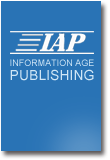
Defining Scientific Literacy in the 21st Century
Edited by:
Keri-Anne Croce, Towson University
Jonah Firestone, Washington State University
Call for Manuscripts
In order to prepare students for studying STEM, science educators have been encouraged to strengthen students’ scientific literacy. Despite this need, much is still unknown about how students read, write, and speak about science texts. The definition of scientific literacy presented in this book embraces the emotional, the cognitive, and the social aspects of reading and writing science texts. This definition of scientific literacy incorporates the tools that learners will need within the evolving world of information within the 21st century.Section 1
One aspect of scientific literacy addresses the emotional aspects of reading and writing science texts. Learners often critically evaluate scientific studies while relating this information to personal decisions or goals (Miller & Czegan, 2014; Britt, Richter, & Rouet, 2014). A reader’s determination of the validity of a science text may influence personal decision-making. For example, a reader may choose to stop smoking after reading about research related to lung cancer. Chapters within this section should address how classroom supports and educational policy may influence how students engage in personal decision making as a result of reading science texts.
Section 2
Another aspect of scientific literacy involves the cognitive. Recently, it has been recommended that learners in school contexts should be able to focus on the skills and strategies needed to read science texts, as opposed to asking learners to obtain one single uniform meaning from a text (National Governors Association Center for Best Practices & Council of Chief State School Officers, 2010). For example, what do good readers do when they are reading a science text and come to a word that they do not know? How should a writer compose a science text? In addition, potential manuscripts might discuss how scientific literacy is often embraced or not embraced within different assessment models. Chapters within this section should address how classroom supports, assessments, and educational policy encourage or discourage students to engage in the critical thinking required to make meaning of science texts.
Section 3
A third aspect of scientific literacy examines the social. Power dynamics exists among text authors, readers, and members of the scientific community. These dynamics can be examined in multiple ways. First, research can examine representation among scientists. Are multiple voices recognized within the field and does this have an impact on scientific discovery? Second, how science is presented to readers may influence support for specific theories. Critical scientific literacy considers how the presentation of images and ideas may influence a reader’s ideas about science (Croce, 2015). In order to examine the relationship between power and scientific discovery, chapters within this section address how multilingualism/translanguaging, critical literacy, and social culturalism impact instruction, assessment, and educational policy. Potential manuscripts within this section might examine how learners draw on their socio-cultural contexts in order to critically think about science texts.
Author Proposed Chapter Abstract:
Abstract should contain between 500-800 words and explain the sequence of ideas provided by the chapter.
Chapter Requirements:
Chapters should be around 25-30 pages in length or approximately 7,000 to 8,500 words including references, tables and figures. Please follow APA 6th edition format.
Send proposed abstracts to: kcroce@towson.edu
Tentative Schedule for Publication:
Abstract Submissions Due to Editors: Nov. 15, 2018
Invitations issues to submit manuscript for review: Dec. 15, 2019
Full Submissions Due to Editors: February 15, 2019
Peer Review of Manuscript: February - April 2019
Feedback Out to Authors: April 15, 2019
Final Drafts Due to Editors: July 15, 2019
Anticipated publication: December 2019

